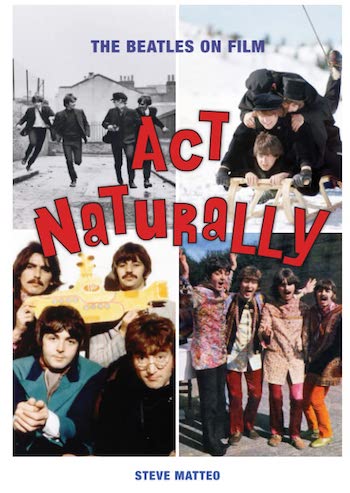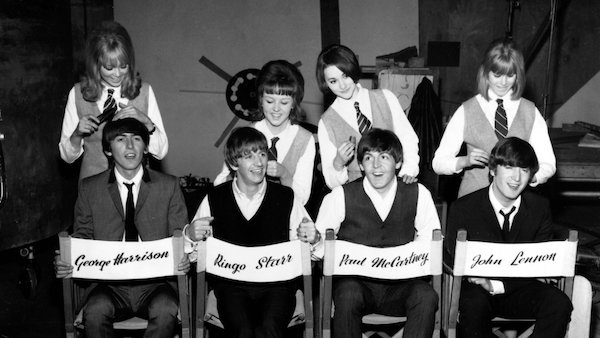Book Review: “Act Naturally: The Beatles on Film” — Everything You Would Want to Know About the Fab Four and Their Five Movies
By Adam Ellsworth
The problem is that the factoids and bits of trivia supplied by Act Naturally rarely tie back to any larger narrative, or serve any discernible purpose other than to be catalogued.
Act Naturally: The Beatles on Film by Steve Matteo. Backbeat Books, 350 pages
 Early in Steve Matteo’s Act Naturally: The Beatles on Film, the author describes the British motion picture genre known as “kitchen sink films.” These were the flicks that debuted in the late 1950s and focused on the nation’s working class, accents and all, with stories centered on poverty, manual labor, broken marriages, homosexuality, abortion, race, gender, and Britain’s declining role in the world. In short, kitchen sink films were the films that didn’t leave anything out.
Early in Steve Matteo’s Act Naturally: The Beatles on Film, the author describes the British motion picture genre known as “kitchen sink films.” These were the flicks that debuted in the late 1950s and focused on the nation’s working class, accents and all, with stories centered on poverty, manual labor, broken marriages, homosexuality, abortion, race, gender, and Britain’s declining role in the world. In short, kitchen sink films were the films that didn’t leave anything out.
Act Naturally could be considered a kitchen sink book. Anything anyone would want to know about the Fab Four and their five movies is included in the work, as are pages and pages on the evolution of British film, youth culture, and English-language rock music in the ’60s. That Matteo casts such a wide net makes sense. After all, the Beatles didn’t make their movies or their music in a vacuum, and they took as much from the culture around them as they put in. Unfortunately, the factoids and bits of trivia provided in Act Naturally rarely tie back to any larger narrative, or serve any discernible purpose other than to be catalogued. Even when the book directly focuses on the Beatles’ films, Matteo seems far more concerned with providing minutiae than with writing a readable story.
Perhaps if Act Naturally were conceived and executed as a pure reference book, it would hold up better. Each film could have its own section, with an introductory essay followed by bulleted lists of facts and figures along with cast and crew bios. There could be sidebars and subsections dedicated to relevant film, cultural, and musical history. As the book exists now, all information is shoehorned into narrative form, leading to unnecessary paragraphs like the following deep dive into the technical specs of the 2012 Magical Mystery Tour box set:
The aspect ratio is 1.33:1. The Blu-ray is presented in DTS-HD master Audio 5.1, Dolby Digital 5.1, and PCM Stereo. The DVD is presented in Dolby Digital Stereo, DTS 5.1, and Dolby Digital 5.1. Everything is housed in a 10-inch box and includes a 60-page book.
Only slightly better than the passages that read like Amazon product descriptions are the ones resembling an IMDb entry. For each of the Beatles’ films, Act Naturally presents a full accounting of the movie’s crew and what these individuals did in their careers before and after their work on A Hard Day’s Night, Help!, Magical Mystery Tour, Yellow Submarine, or Let It Be. The intent here is commendable. Why not give the reader as much info as possible about the unsung heroes who created these beloved movies? The problem, again, is in the presentation. It’s taxing to read paragraph after paragraph of factoids like “Assistant director John Merriman worked in the same capacity on It’s Trad, Dad! and served as production manager on Zulu and the original screen version of Casino Royale (1967).”
Needless to say, Act Naturally can be a tough read. It’s greatest sin, though, is not that it has too many facts, or that those facts are presented in too dry a manner, but that so many of these nuggets don’t lead anywhere interesting. They don’t provide any meaningful insight, or broaden our understanding of the Beatles and what they accomplished. They’re just … there.

The Beatles being prepared for for their close-ups.
Take the kitchen sink film passages. As noted, these pictures, like 1959’s Look Back in Anger, featured working-class protagonists, accents intact, with stories focused on the reality of their everyday lives. It doesn’t take a great leap to propose that the introduction of such movies into British culture helped open the door that four Scousers from Liverpool ran through a few short years later. But that idea is never floated in Act Naturally. Kitchen sink films, along with the rest of the British movie history included in the book, should serve as a nurturing context for analysis. Instead, it’s all just more information for information’s sake.
In the end, Act Naturally is a missed opportunity. The book is brimming with facts, but none of the data is presented in a way that’s easily digestible, or that sheds any real light on the Beatles or their films. Perhaps as a traditional (or even nontraditional) reference book, it would have worked. As a narrative, it’s a slog.
Adam Ellsworth is a writer, journalist, and amateur professional rock and roll historian. His writing on rock music has appeared on the websites YNE Magazine, KevChino.com, Online Music Reviews, and Metronome Review. His non-rock writing has appeared in the Worcester Telegram and Gazette, on Wakefield Patch, and elsewhere. Adam has an MS in journalism from Boston University and a BA in literature from American University. He grew up in Western Massachusetts, and currently lives with his wife in a suburb of Boston. You can follow Adam on Twitter @adamlz24.
Tagged: Act Naturally: The Beatles on Film, Backbeat Books, Steve Matteo

I loved your cogent review. However, I have to take issue with the whole definition of “kitchen sink films” or the slightly older term “kitchen sink dramas,” referring to 1956’s Look Back in Anger and others. It has nothing to do with the phrase “Everything and the kitchen sink.” It has a simpler meaning. Theses dramas often take place in the kitchen, as opposed to the drawing rooms of the upper class types who populated British dramas for so many years before the 1960s. All it means is “working class drama.” I think the sink is part of the phrase to make it seem even more about the nitty-gritty of life. I believe there are some specific scenes where the wife is washing dishes while arguing with her husband. I don’t think the variety of subjects is at issue here, though the whole film and theater movement was a huge, dramatic turn away from the posh set, and the many issues and problems of the working poor came to the forefront for the first time. That the English rockers came right on the heels of the cinematic revolution is quite true. One led to the other.